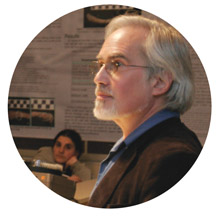Pitt to Host Feb. 28 International Conference on Global Warming
Jeffery Schwartz to be installed as president of the World Academy of Arts and Sciences
 Slash-and-burn agriculture in Vietnam, switching to more energy-efficient light bulbs in the United States—both of these impact the climate and contribute to a patchwork quilt that constitutes the global picture. To address the situation, the University of Pittsburgh is hosting “Beyond Global Warming,” an international conference encompassing presentations by those in the sciences and the arts, on Feb. 28.
Slash-and-burn agriculture in Vietnam, switching to more energy-efficient light bulbs in the United States—both of these impact the climate and contribute to a patchwork quilt that constitutes the global picture. To address the situation, the University of Pittsburgh is hosting “Beyond Global Warming,” an international conference encompassing presentations by those in the sciences and the arts, on Feb. 28.
The conference is to be held from 9 a.m. to 5:10 p.m. in 4127 Sennott Square on Pitt’s Oakland campus.
The conference also marks the installation of Jeffrey Schwartz (photo at right) as president of the World Academy of Art and Science (WAAS) at 9:15 a.m. Schwartz is a Pitt professor of anthropology and history and philosophy of science and a fellow in the University’s Center for Philosophy of Science. The University will house WAAS during Schwartz’s four-year tenure as president.
Sponsored by the Pitt School of Arts and Sciences and Department of Anthropology and WAAS, the conference is divided into two sections. The morning session is titled “Global Challenges of the Future.” Tariq Banuri, senior fellow and director of the Future Studies Program at Stockholm Environmental Institute, Sweden, will deliver the morning keynote address, “The Great Transition: Is the Past a Key to Global Challenges of the Future?” at 10 a.m.
Banuri’s address will be followed by a panel discussion featuring Robert J. Berg, member of the WAAS board of trustees and director of the United Nations Association Graduate Fellows Program in Washington, D.C.; Joseph Alter, professor and chair of Pitt’s Department of Anthropology; Agni Vlavianos Arvanitis, president and founder of Biopolitics International Organisation, Athens, Greece; and Bruno Maresca, professor in the Department of Pharmaceutical Sciences at the University of Salerno, Italy.
The afternoon program will address the question, “Can the Arts and Sciences Collaborate on Global Issues?” Ismail Serageldin, director of the Library of Alexandria and chair of BioVision Alexandria in Egypt, will present the keynote address “Complex Realities: Science, Humanities, and Art” at 2 p.m.
Serageldin’s address will be followed by a panel discussion featuring Jose I. dos R. Furtado, chair and secretary-general of WAAS and visiting professor in the Centre for Environmental Policy at Imperial College, London, UK; Colin MacCabe, international film producer whose most recent film is Derek (2008), Distinguished Professor of English and Film at Pitt, and a professor in the Department of English and Humanities at Birkbeck University, London, UK; and Juliana Spahr, associate professor and W.M. Keck Chair in Creative Writing at Mills College, Oakland, Calif.
An overview of the conference will be given from 4 to 5 p.m. by Walter Truett Anderson, outgoing WAAS president and founding fellow of the Meridian International Institute, San Francisco, Calif.; Arvanitis; Banuri; Berg; Furtado; MacCabe; Serageldin; and Spahr. Schwartz will make closing remarks at 5 p.m.
A full schedule is available at www.as.pitt.edu/news/articles/global_warming_conf.html.
Other Stories From This Issue
On the Freedom Road

Follow a group of Pitt students on the Returning to the Roots of Civil Rights bus tour, a nine-day, 2,300-mile journey crisscrossing five states.
Day 1: The Awakening
Day 2: Deep Impressions
Day 3: Music, Montgomery, and More
Day 4: Looking Back, Looking Forward
Day 5: Learning to Remember
Day 6: The Mountaintop
Day 7: Slavery and Beyond
Day 8: Lessons to Bring Home
Day 9: Final Lessons

